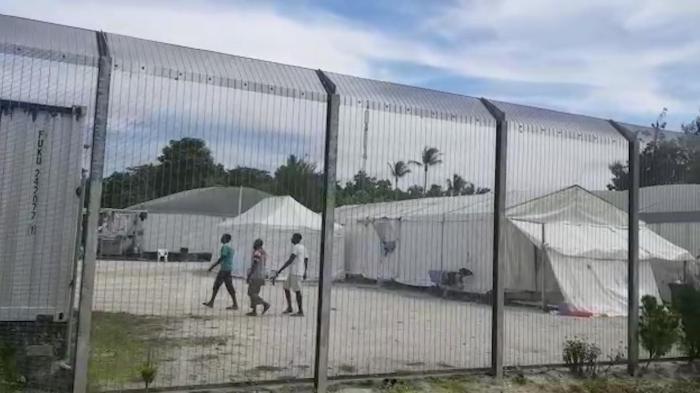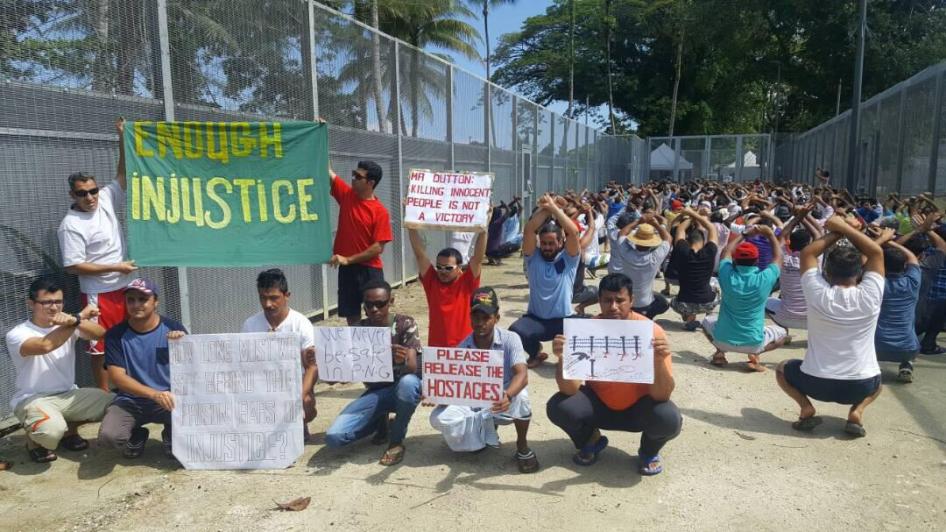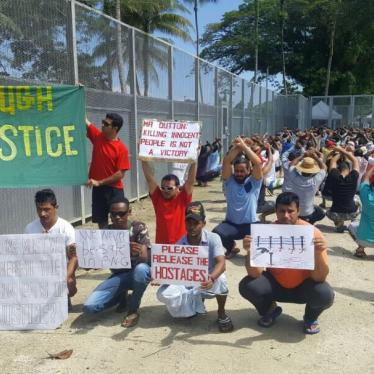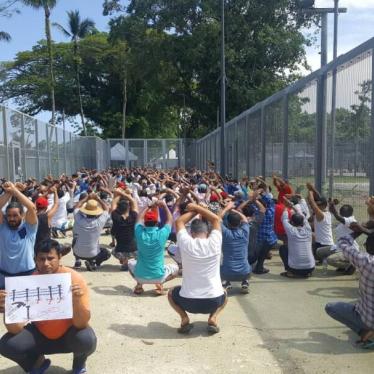Since October 31, hundreds of men have barricaded themselves in an abandoned complex on a naval base where security forces have previously shot at and attacked them. Exhausted, with no power and no running water in the tropical heat, they stockpiled food, dug water wells, and collected rainwater in trash cans to drink. Now, they are dehydrated, starving, and scared.
These men are not in a war zone, though many of them have fled war in places like Afghanistan, Iraq and Sudan. They are refugees and asylum seekers trapped on remote Manus Island in Papua New Guinea. They are there because of Australia’s harsh refugee policies.
The UN has described the situation as an “unfolding humanitarian emergency.” On October 31, the Australian and PNG governments closed the regional processing center where these men have lived for the last four years. Other less-secure facilities are available in a town a 30-minute drive from their current location. But these men, refugees and asylum seekers, refused to leave, terrified by escalating violence against them by some local residents in the town and frustrated by the lack of a long-term solution to their predicament.
Since July 2013, male asylum seekers traveling by boat to Australia have been sent to Manus Island, while men, women and children have been sent to the isolated Pacific island nation of Nauru. As Paul Tyson wrote for openDemocracy, “in real terms, it is the boat people themselves the Australian government has criminalized, dehumanized and demonized, and it is against them that Australian politicians on both sides of party power have uncompromisingly ‘stood firm’ in refusing to open their hearts with human compassion to the plight of the desperate.”
Australia says the refugees on Manus can settle in PNG, move to Nauru, wait on Manus for possible resettlement offers from the US or return home. So far only 25 refugees from Manus have moved to the United States under a resettlement arrangement, and it’s unclear how many more, if any, will follow. Failed asylum seekers are to return to their home countries.
In September, I visited Manus Island and PNG’s capital, Port Moresby, and spoke to 40 refugees and asylum seekers. I heard repeated accounts of violent assaults and robberies. Groups of young local men, often intoxicated, approach refugees both day and night, threatening them with knives, machetes, and sticks, beating them if they don’t hand over cash and possessions.
In August, one man was beaten so badly with a metal rod his skull was fractured and he had to be brought to Australia for treatment. In July, a local man slashed an asylum seeker’s forearm with a knife and authorities had to evacuate him to Port Moresby. Police have not investigated these attacks.
Now, following a PNG 2016 Supreme Court ruling to close the main center, Australia has handed over operation of new facilities on Manus to the PNG government. Australia will pay A$250 million [USD$192 million] for the next 12 months of operations for about 770 refugees and asylum seekers.
Meanwhile, the PNG Immigration Minister Petrus Thomas has insisted that Australia remains responsible for the 200 or so men who are failed asylum seekers and all refugees who do not wish to remain in PNG, that is, everyone except 35 who signed settlement papers. “PNG has no legal obligation under the current arrangement to deal with these two cohorts and they remain the responsibility of Australia to find third country options and liaise with their respective governments of the non-refugees for their voluntary or involuntary return,” he wrote in a statement.
His message to Australia: paying off other countries to relieve you of your international obligations is no solution.
Some European politicians have looked approvingly at Australia’s “harsh but effective” policies that Australia says have reduced boat arrivals and claims have saved lives at sea. If, in fact, it is saving lives at sea, it is only to let them suffer ashore. Two refugees on Manus recently committed suicide. A significant number are self-harming. The policy’s apparent success in deterrence relies upon sacrificing hundreds of lives by warehousing them in miserable conditions and exposing them to violence and neglect.
With every passing day, the refugees and asylum seekers struggle to survive at the main center. PNG officials have repeatedly ordered men to leave the main center, threatened to “apprehend” the “ringleaders” of the protest, and in a particularly low act, destroyed water storage tanks and removed sun shelters from the main center. It is unclear if PNG defense force personnel will remove them by force or if the refugees will run out of food and water.
“Please help us, we don’t want to die here,” a Sri Lankan Tamil refugee implores me over Whatsapp. It’s difficult to read their messages and not be overwhelmed with despair.
But Australia can end this human rights tragedy. Wherever they end up eventually, the Australian government needs to immediately bring these men to safety. As a partner of Australia in resettlement, the US should be urging Australia to do so. For Australia to abandon them on Manus Island is to invite disaster.











